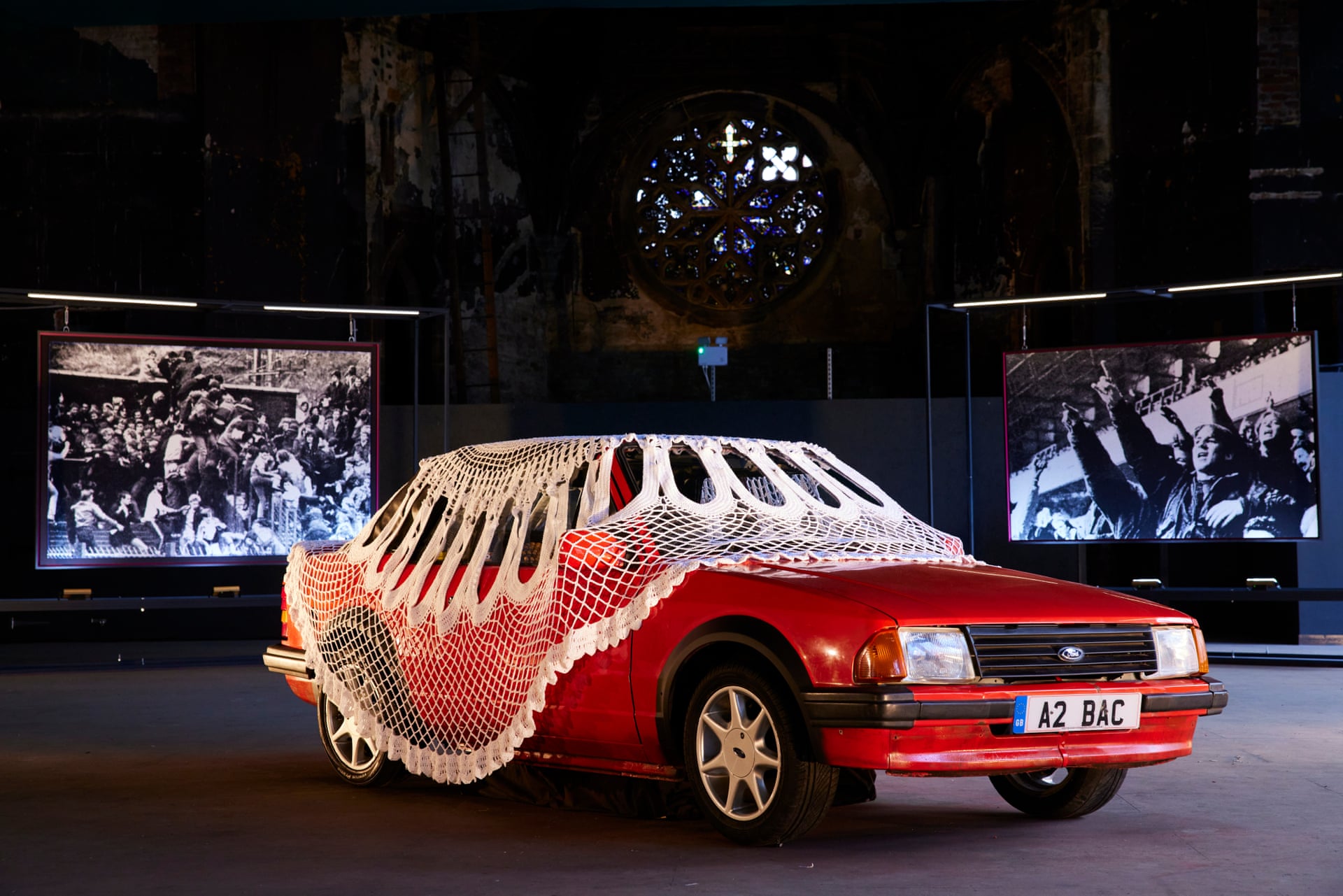
Jasleen Kaur and Jamie Holman as part of The British Invasion, Photo – Christopher Thomund / Guardian
BTB21 turned its attention to the global nature of textiles and the relationships they create. Turner Prize winner, Lubaina Himid presented an epic installation using (so called) Dutch Wax Print in the Great Barn at Gawthorpe Hall, while three artists, Jamie Holman, Jasleen Kaur and Masimba Hwati revealed the residual cultural identities of the British Empire embedded in textiles, In the grandiose surroundings of Blackburn Cotton Exchange.
In the year marking the 90th anniversary of Gandhi’s historic visit to Darwen, Re-Thinking Khadi was an exhibition of new work by Bharti Parmar that took the textile archive of Blackburn Museum and Art Gallery as its focus, exploring how textiles, and specifically Khadi, might represent the ‘Black’ Indian body. Gandhi’s homespun philosophy was the inspiration behind Homegrown/Homespun; a collaboration with designer Patrick Grant, Super Slow Way and North England Fibreshed, seeking to create the town’s first homegrown and homespun garment.
The tension between the industrialisation of cotton manufacturing and traditional cottage industry was the starting point for James Fox’s new work at Helmshore Mill that included new film collaboration with Maxine Peake. At Queen Street Mill, Burnley, works by Reetu Sattar, Raisa Kabir and Brigid McCleer explored the different dimensions and impacts of the UK’s appetite for fast fashion and profit on the textile industry in South Asia across the centuries.
Azraa Motala produced a series of works that provided a platform for an overlooked community of young British South Asian women from Lancashire, too often invisible and unheard, in a powerful series of portraits that were displayed in Blackburn Museum and reproduced on giant banners on civic buildings in Blackburn, Pendle, Accrington and Burnley.
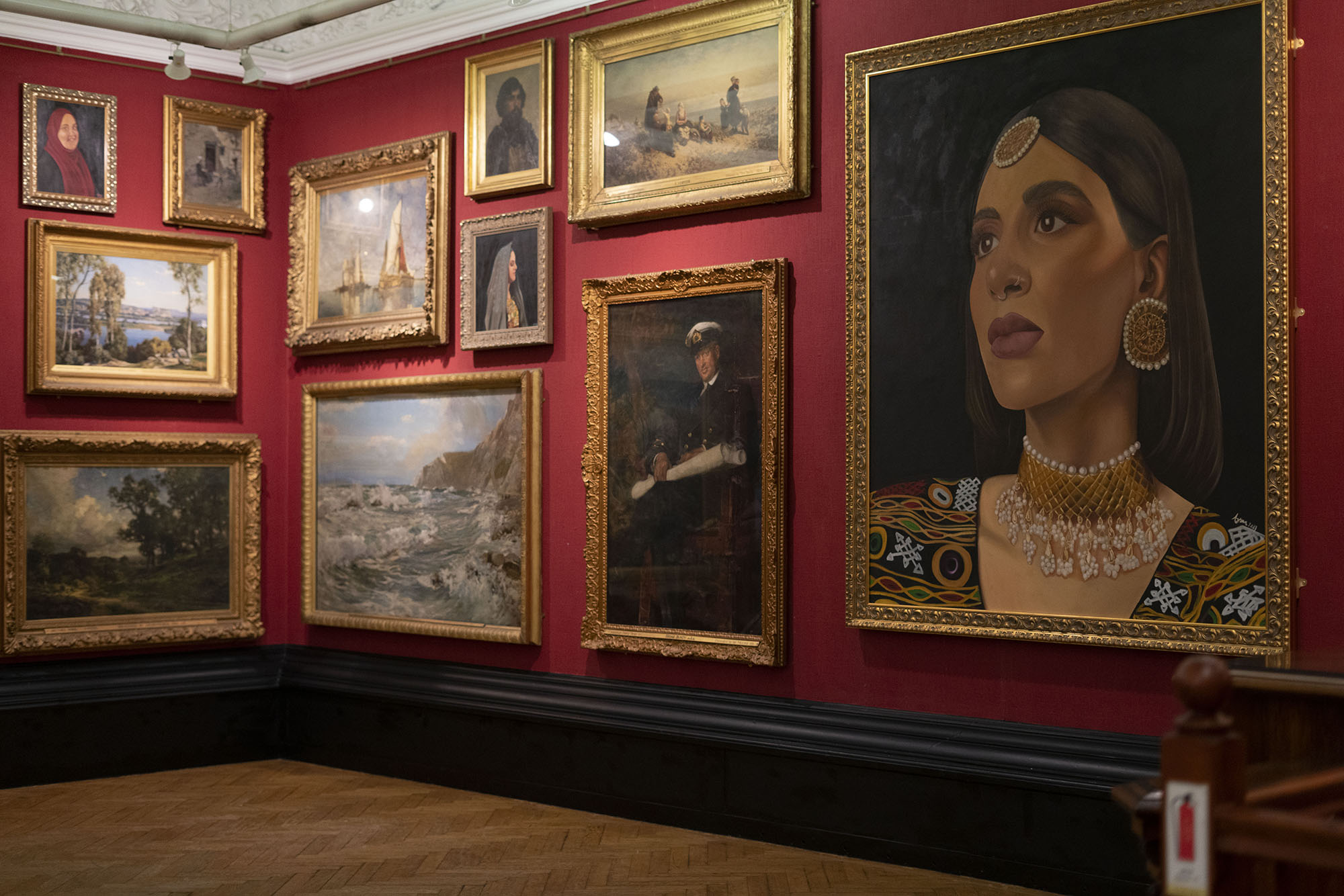
Azraa Motala, Unaplogetic, Photo – Lee Smillie
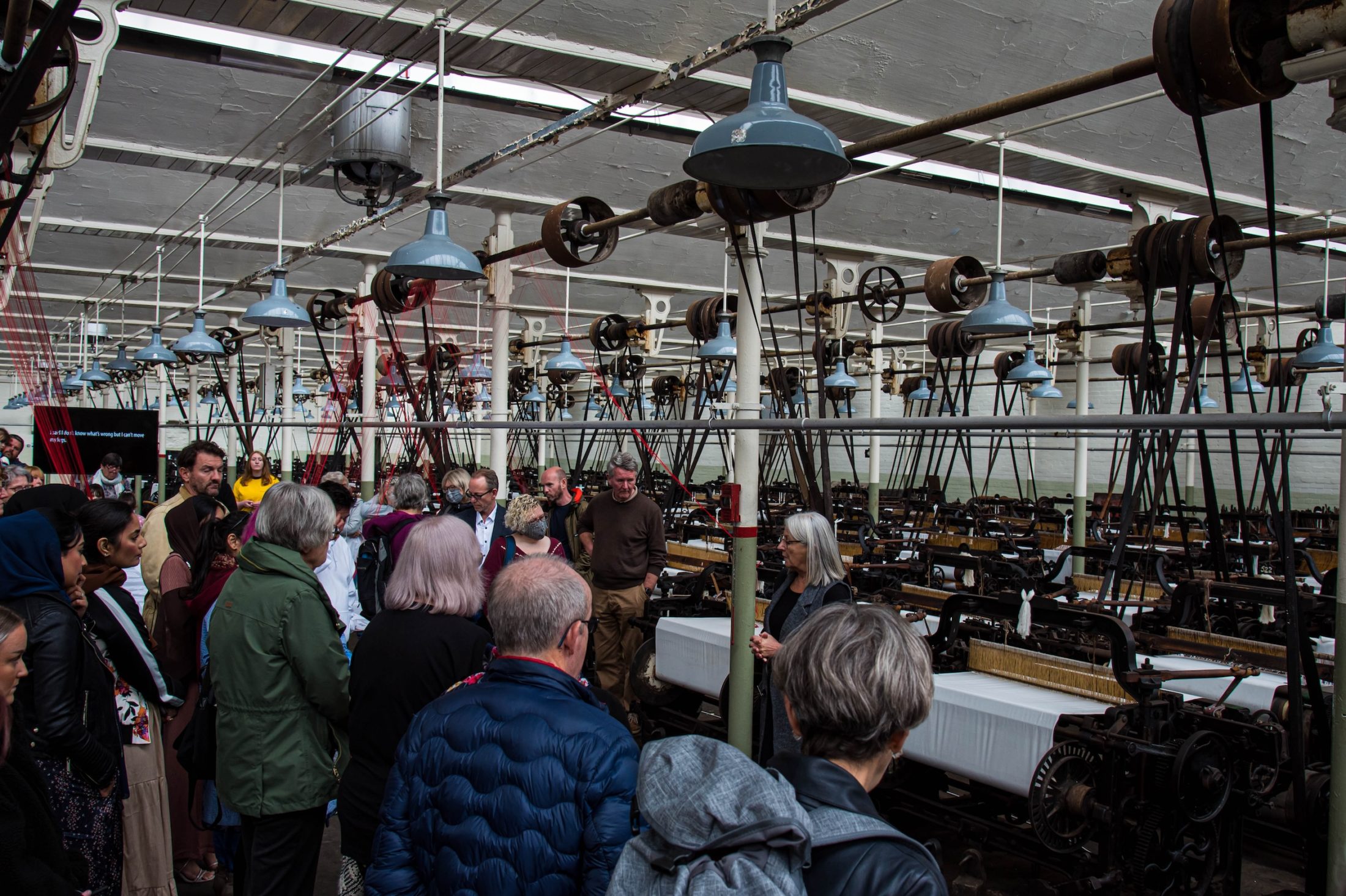
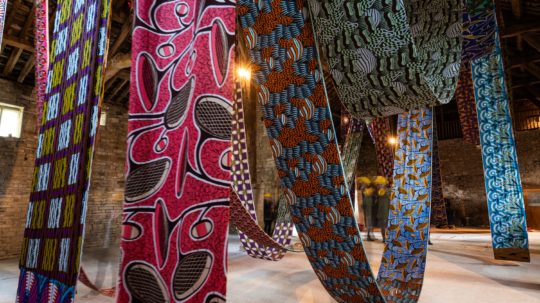
Lubaina Himid
Lost Threads
Turner Prize-winning Lubaina Himid presented a major new work held at Gawthorpe Hall in Burnley. Cascading through the structure of Gawthorpe Hall’s Great Barn, 400 metres of Dutch Wax fabric reflect the movement of oceans and rivers that have been used to transport cotton across the planet and over centuries.
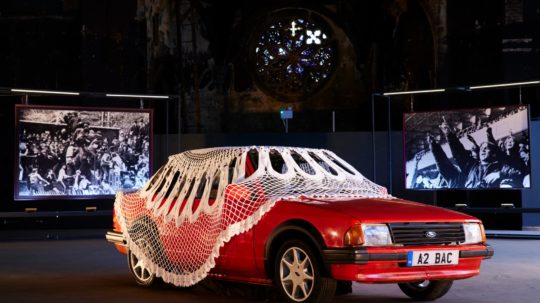
Jasleen Kaur, Jamie Holman & Masimba Hwati
The British Invasion
In the grandiose surroundings of Blackburn Cotton Exchange, three artists, Jasleen Kaur, Jamie Holman and Masimba Hwati interrogated complex issues through family histories and lived experiences across three continents to reveal the residual cultural identities of the British Empire.
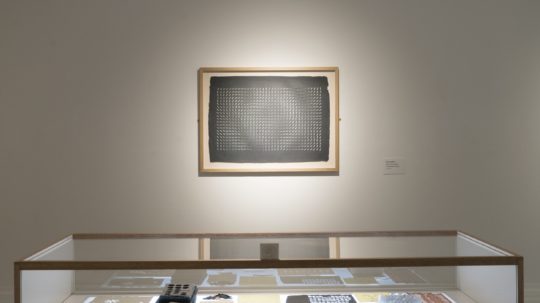
Bharti Parmar
Khadi
In the year marking the 90th anniversary of Gandhi’s historic visit to Darwen, Khadi was an ambitious new installation by Bharti Parmar comprising archival images of the Mahatma’s visit, artefacts from Blackburn Museum and Art Gallery and delicate drawings and sculptures made from Khadi paper.
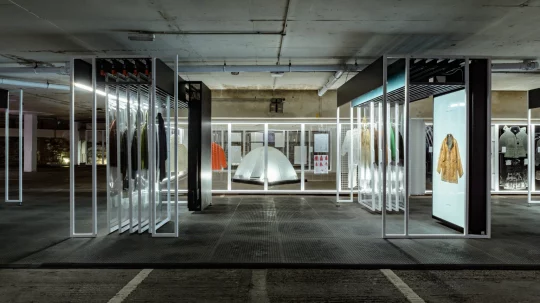
C.P Company
Cinquanta
As part of the brands 50th Anniversary celebrations global sportwear icons C.P. Company will be taking part in the British Textile Biennial 2021 programme, presenting a retrospective dedicated to five decades of Italian Sportswear, and Massimo Osti’s lasting legacy.
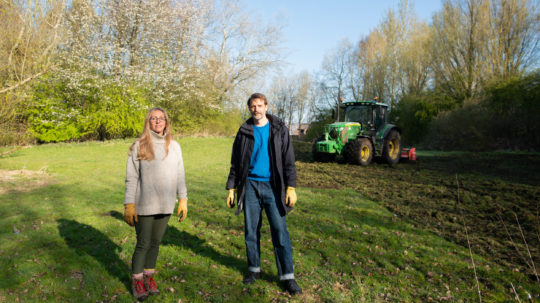
Homegrown/Homespun
Homegrown/Homespun is a ground-breaking regenerative fashion project in collaboration with designer Patrick Grant, his social enterprise Community Clothing and North West England Fibreshed.
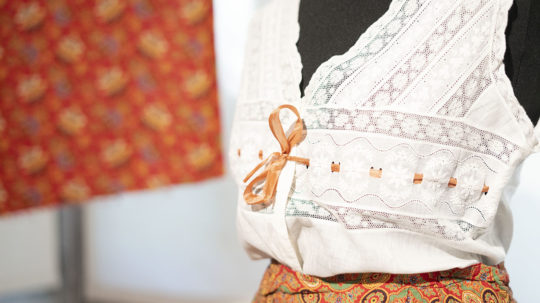
Amber Butchart
Cloth Cultures: Stories of Movement, Migration and Making
In the beautiful Arts & Crafts interior of a former mill owner’s house, Haworth Art Gallery, Accrington, fashion historian Amber Butchart presented an exhibition with pieces chosen from the Gawthorpe Textile Collection.
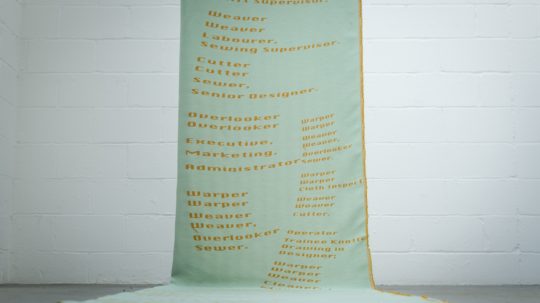
Raisa Kabir
Resistances
For BTB21 Raisa Kabir presented work at Queen Street Mill as a continuation of her Art in Manufacturing residency, commissioned by The National Festival of Making and the British Textile Biennial in 2019.

Brigid McLeer
Collateral
Brigid McLeer presented a memorial to the hundreds of workers who die in factories and sweatshops across the world that supply the global garment industry.
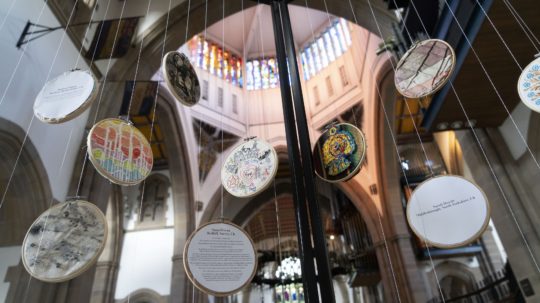
Jamie Chalmers
Stitch Your Story
In a public call out, people from all over the world were invited to share their own story of migration and belonging in this crowd-sourced collection of stitched hoops curated by Jamie Chalmers (Mr X Stitch), featuring representations from people’s journeys and reflections on their personal heritage.

Tiwirayi Ndoro
Woke Denim
The Woke Denim project was a conscious photo series about the modern-day fight for civil rights, following the Black Lives Matter movement of 2020. The project drew focus on young people, a generation of activists who refuse to say yes to injustice but demand to be heard not just in towns and cities but on a global scale with the help of modern-day technology.
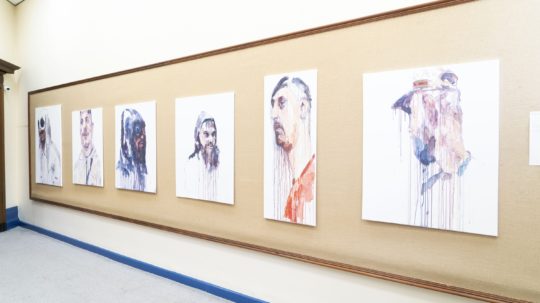
Adil Amin
The Hoodie Series
Adil Amin was born in Blackburn after his parents moved here from Pakistan in the late 1970’s. After graduating with a Foundation Degree in Fine Art from Blackburn College, Adil worked in a variety of jobs while developing his painting practice.
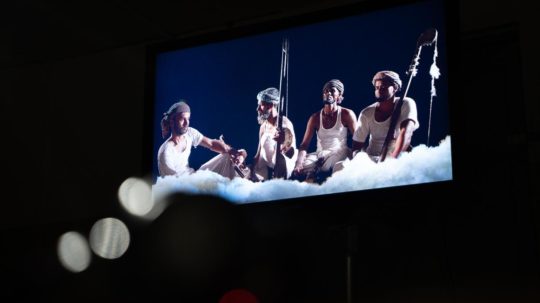
Reetu Sattar
Shabnam
Shabnam is a film that explored the historic and continuing relationship between East Lancashire and Bangladesh in a textile tug-of-war
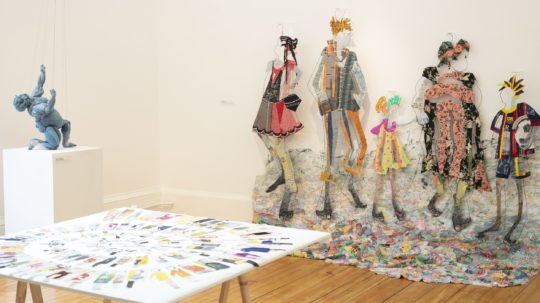
The 62 Group
Connected Cloth
The 62 Group of Textile Artists is an artist-led group with an international reputation whose aim is to question and challenge the boundaries of textile practice and to encourage a greater awareness of the art form. The membership is worldwide and consists of approximately 60 exhibiting members, comprising both established artists and recent graduates.
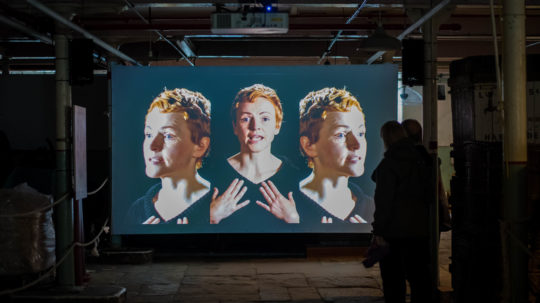
James Fox
Rights, Riots and Routes
The tension between the industrialisation of cotton manufacturing and traditional cottage industry was the starting point for James Fox’s work that explored the history of protest and punishment via the Lancashire loombreaker riots of 1826.
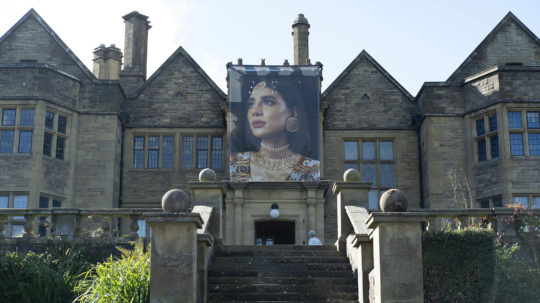
Azraa Motala
Unapologetic
For BTB21 Azraa Motala created work that untangled culturally inherited expectations and the overlapping aspects of her own identity as a young British-Asian Muslim woman, exploring the way in which women from the diaspora have been represented in both the past and the present day, particularly through their dress.

Portrait Youth
Portrait Youth was a participatory research project, led by staff from the Manchester Fashion Institute at Manchester Metropolitan University.
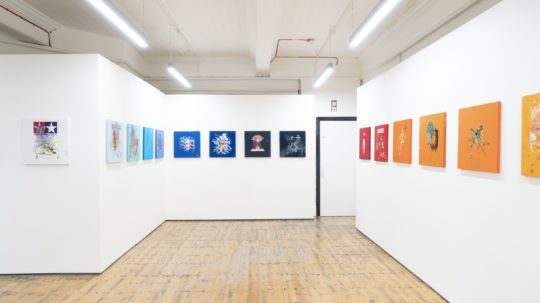
John Tiney
Shirts
John Tiney harvested T-shirts from charity shops, to present a series of works from a “creative production line” of archiving, wearing, staining, screen-printing, stretching and treating which bears the physical marks of his process.
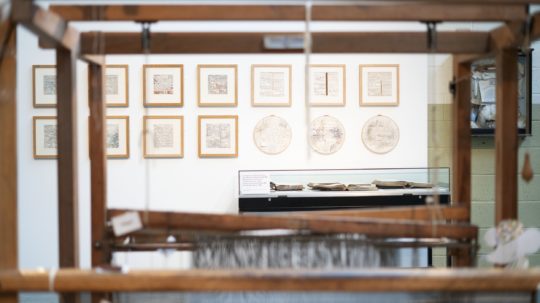
Sharon Brown
Stitched Histories
Textile Artist Sharon Brown presented new work at Queen Street Mill which reimagined found letters and documents connected to the history and workers of Lancashire cotton mills.
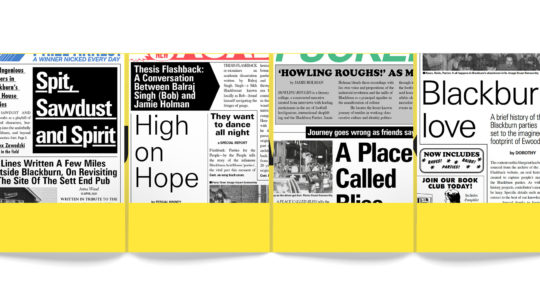
Uncultured Creatives
Flashback Publication
In 2020 Uncultured Creatives ‘Flashback’ built a digital archive of ‘acid house’ activities manifesting in Blackburn and East Lancashire from 89-91.
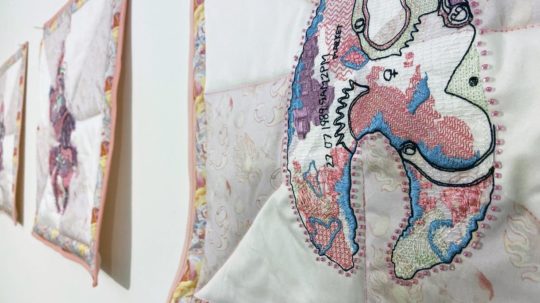
Sarah-Joy Ford
Oranges are Not the Only Fruit
Sarah-Joy Ford presented a site specific installation at Accrington Library of her quilt: Oranges are Not the Only Fruit, which responded to Jeanette Winterson’s novel.
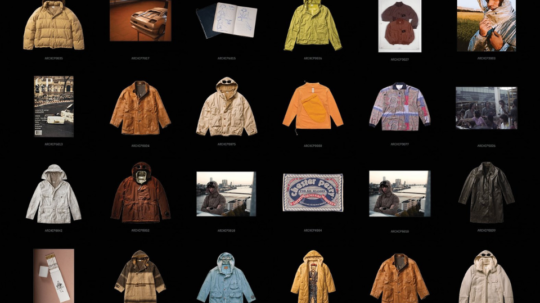
C.P Company
C.P Library
In association with C.P. Company, the Westminster Menswear Archive presented an archive selection celebrating the brand’s 50th anniversary with a display in Darwen Library.
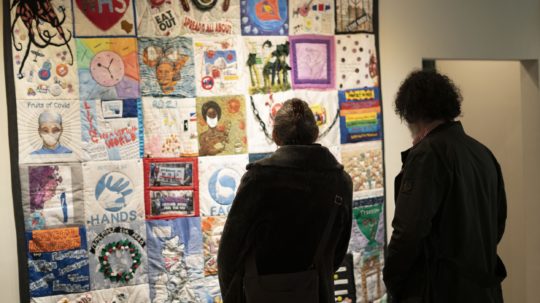
Threads of Survival
999 Call For the NHS
There is a long tradition of quilts and tapestries documenting social and political history. Threads of Survival followed that tradition. An exhibition of quilts made during the lockdown period by groups and individuals across the country reflecting on life during the pandemic and the role of the NHS.
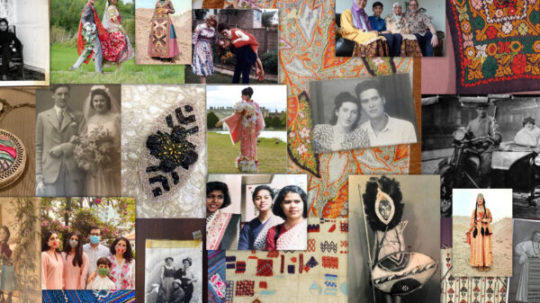
Patterns of Migration
Sharing Stories Through Clothing & Textiles
Patterns of Migration was a project about sharing stories through clothing and textiles, exploring themes of home and belonging. The focus of the project was on clothing and textile objects from across the world, their journeys, and the lived experiences of their owners.